

Special:
4Players: Mr. Le Breton, would you like to introduce yourself?
Le Breton: I am Erwan Le Breton, Associate Producer of Dark Messiah and also coordinator for the Might & Magic world as it is being recreated at Ubisoft.
4P: You have the license "Might & Magic” and you have worked with what had been done with it before. Is there anything you had to change?
Le Breton: When we had gotten the license, the first question we asked ourselves was: "As we have a fancy license we need a strong fantasy world. There is one already. Is it the one we want to use?” And we decided it was a risk to do it, because we didn't have all the assets of these games, of this world given to us by 3DO and New World Computing.
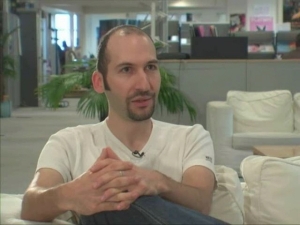 |
| Erwan Le Breton at his workplace. |
So we analyzed what we knew. We especially asked the fans: "What do you like when you play Might & Magic, what do you remember as being memorable, as big moments?” And we discovered that we had a couple of elements we really needed to keep: The fact that it is a high fantasy world with trolls, elves and so on – the archetypes – the fact that it was epic, that the world was huge, that you explored beautiful landscapes which were very open. You would go after artifacts that had the power to save the world or destroy it and you would become very powerful in the end. We wanted to keep that epic dimension. The world was split into factions: We have the demons of the Inferno, the dead of the Necropolis, the wizards of the academy – we wanted to keep that, too. And also, the final touch was the fact that in the old Might & Magic games you were often asked to choose between good and evil. And you played characters who were not paladins hiding in a shining armor but something more in shades of gray. We liked this ambiguity in the former titles. We felt these were the core values of this brand and we wanted to keep them.
Then we decided that we were not really happy with some of the features, for instance the science fiction undertone. When you completed the game you often discovered that behind the angels and the elves and the powerful magical artifacts there was technology. There were spaceships, there were blaster guns, and we felt it was not quite wanted for this new world of Might & Magic. We really wanted hardcore fantasy with no
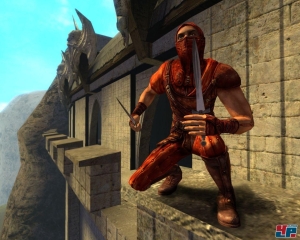 |
The assassin from the multiplayer mode. His blades may be small, but you won't see him coming.science fiction or technology in it.
This is the kind of choices we had to make very early on. And once it was done the other task was: "OK, WHO will do it?” *laughs* So, we had to hire a team of writers and graphic artists...
4P: Anyone who had been working on the former Might & Magic games?
Le Breton: No. For good reasons, because there were two or three people who were really important within the Might & Magic brand, like the CEOs of New World Computing, the Executive Producers, but they didn't want to get involved just to be a writer for the background document. It was not very exciting for them. And in case of the writers who had worked on the former games, they were hired for certain tasks, but they weren't really part of the creative team. So we said we are going to find people who have a background in creating worlds and stories and who have played the Might & Magic games and liked it and who are really into fantasy but also with the more modern edge that we want to give to the world.
Our lead writer was the perfect guy for that. His name is Richard Dansky. He works for Ubisoft as a writer and before that used to work for White Wolf. It's a pen & paper role playing company very well known for the game Vampire: The Masquerade. For three to four years before he joined Ubisoft he had been working for them as a line editor and world creator, so he knew a lot about role playing games in general and a lot about building worlds. He had written four novels. He knew about video games as well. He knew about Might & Magic. It was perfect and so he was the lead writer. I myself was the coordinator, the guy who made sure that the core visions were respected and that everyone on the project was following the same philosophy and also to make sure that the information was given to the developers.
For the graphics we hired Olivier Ledroit, maybe you have seen some of his artworks on the website. He has a 17 years experience in doing comic book series in France, so he's a veteran. He does dark fantasy. He also did a cyberpunk thriller, he was the visual artist on Requiem, which is dark horror, gothic horror. It's really dark and gory. This is the kind of stuff that fit into the idea of this new darker world. His style looks a little bit like Warhammer, because it's exaggerated – Knights have swords twice as big as themselves and huge shoulder pads – but it looks less bulky. Usually his characters are very thin, it looks a little bit like what the Japanese can do.
4P: Did he design characters for the game?
Le Breton: Not really the characters, because Nivel and Arkane had done a lot of artworks before Ledroit started. But at least he gave strong visual codes for the factions: Armors, symbols, color schemes, weapons – that kind of stuff. He will have a stronger impact on the future of Might & Magic games, because now we have 25 artworks from him and he is doing some more, so if we did a new Might & Magic game tomorrow, this is the source we'd take our inspirations from. Here it was more like: "In the game they look like this [the characters, ed.], so
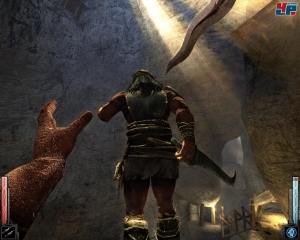 |
His bad: Strolling around distracted during his watch gets him stabbed in the back.I'll base my drawings on that, but I'll add my own style and make them look bigger, more impressive and then I give it back to the developers. If they can tweak it – great! If they don't have time – too bad.”
4P: Where did the idea come from to change from role playing and strategy games to first person shooter? Was it to make the game more intense and fancy?
Le Breton: No. We had the license, we had decided to make Heroes [of Might & Magic] 5, of which we knew where it was going and who would do it, and then Arkane Studios came to Ubisoft with this concept of an immersive action game within a fantasy universe and the Half-Life 2 engine. And we said: "Oh, we've got Might & Magic, so you know, that could work!” *laughs* So, that's how it was born.
4P: Did they always want to do an action based first person game. After all they had done Arx Fatalis before, which is quite different from Dark Messiah.
Le Breton: Well, for them Dark Messiah really is what Arx Fatalis 2 would have been. They really wanted Arx Fatalis to evolve and become like this. They are big fans of Valve and the Source engine, so they really wanted it for their game. They had this feeling that they wanted Arx Fatalis 2 to look like Half-Life 2 but with their own vision, their own world.
4P: Had they already worked on the project when they got to you?
Le Breton: Yes, they had a prototype, a game design document. They had several concept arts. They were ready to go into production with a game that had no name and no publisher at the time. We talked about how we could make it a Might & Magic game. At first they said: "Might & Magic is not the same kind of world”. But we told them what we had in mind, that we were building a new world and that the guy who wrote the bible came from this background. Then they said: "Well, in this case, if we make it more modern with no guns and no robots, then that's the game we want to do.” That's how we came to an agreement.
4P: So you always wanted to evolve the Might & Magic franchise and they were just there and it was a perfect fit.
Le Breton: Exactly. And first it was really hard to convince people, even within Ubisoft, that it was interesting to do a first person melee game in a fantasy world, but very soon we had a prototype which had shown that it could work. We started to present the game last year in Leipzig and the public became enthusiastic about the gameplay, so Ubisoft said: "Alright, people can appreciate this kind of game, so let's go for it.”
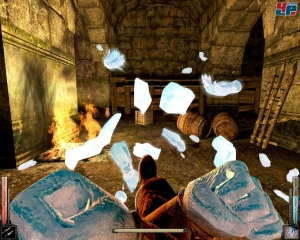 |
Deep fried and kicked into pieces: This bad buddy means no more trouble.
4P: As far as I know, readers are still undecided about what to make of the game when they first hear "Might & Magic” and then "first person shooter”. What do you tell them what's unique about it, what are the main features?
Le Breton: I think the main experience you get from it is: It really gets you into this fantasy world. Immersion is one of its key values. I know everybody says: "My game is very immersive!” Bu for us immersion is not only nice graphics, nice music, first person. It's also the fact that all the physics in this game are here to make you feel like being in a real world. If in the real world you can grab a chair and throw it and burn it you can do it the game, too. Now that we are tweaking the last details we feel that we achieved what we wanted. We sell this game to people who like Half-Life 2 and Doom as well as to those who are more into online play, who like Battlefield or CounterStrike. So it's definitely a game for FPS players.
But when we showed the game at E3 we had a lot of fans, RPG fans, Might & Magic fans, who came to us. They couldn't get their hands on the demo, but they said: "Wow! It's not that different from Oblivion in terms of feelings and emotions. OK, the controls are FPS-like. I don't have a certain amount of hit points, I have to be quick and alert and I have to learn the controls and the mechanics of the game in order to win.” But we plan to do different difficulty modes – easy, normal, hardcore, insane *laughs* and we really feel that someone who is not into FPS but feels attracted to a fantasy universe and plays the game in easy mode should be able to finish it and really enjoy it a lot. Because there is this scenario that helps you discover the world, the plot, the different characters, different races, so you really are embarked on this high fantasy experience and you are being guided along the way. And the music and the graphics make you feel like you are in Peter Jackson's movies.
4P: You talked about the story before. How is it being told? By cut scenes or Gordon Freeman style?
Le Breton: In Heroes you have only cut scenes, but in Dark Messiah it's more immersive. That means you have about seven different cut scenes throughout the game and they are all very short. They
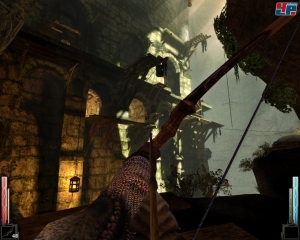 |
Again and again your way leads alongside impressive installations.are mainly about the apocalyptic events that we can't show with the game engine. We had to use cut scenes for that. Other critical information is often provided through dialog with different characters, but you have to make sure that the player listens to them and understands. You can't have that with the concept of our game, because you are always in control and could kill the guy speaking to you or you cold move away – you could do hundreds of things that prevent you from getting information.
So you have a female spirit who, at the beginning of the game, is being fused with your soul by your master. She is supposed to be your guide and your guardian. She will help you, talk to you a lot – a little bit like Cortana in Halo, this embodied voice who tells you things about what's going on. She is one of the tricks we use to give you information. The other source of information is when you overhear people talking. Of course, you can kill everyone, trying to finish the game like that. But if you try to listen to people or enemies talking by trying to sneak or hide yourself you get more information. It is either flavor or bonus, because it can give you hints about sub quests, but it is not critical.
4P: Do you get sub quests like in role playing games or are they about smaller things?
Le Breton: It doesn't look at all like a role playing game where you get a quest and then another one which is unrelated to the big picture. Here you are on your path with different objectives along the way. Once they are fulfilled you get skill points, which allow you to upgrade your character and customize him. Sometimes you have secrets. They are very short and give you a bonus, something like: "While you are here, there is a chest nearby...”
4P: Does the story evolve in a linear way or do you get to make choices?
Le Breton: It is linear most of the time. The gameplay itself is not linear in that you can choose between hundreds of opportunities. It will be different depending on whether you chose to be more of a rogue, a warrior or a mage. And if you use the elements, the physics around you, it may be ten times easier. If you set fire and lure the guards into it you can kill five guys in a second. If you are a wizard you can freeze them, push them, make them explode or freeze the ground, so that every time they come forward they fall to their death because it is on an edge – you got different ways to achieve the objective. Also, during the last third of the game you are going to face two critical choices: left or right. They will have an impact on the end of
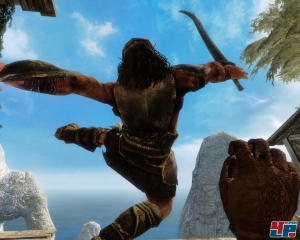 |
Have a nice flight: This former enemy just stood too close to the abyss to let the chance go.the game. We give you four different endings, depending on which way you choose. That's not a lot compared to a role playing game, but for an action game I think it is very much.
4P: Something I am always interested in: Who is going to do the music and what is it going to be like?
Le Breton: We hired an American composer named Sascha – I can't remember the full name [Sascha Dikicyian, ed.]. He is from Eastern Europe and he was chosen mainly because his style is very close to what [Hans] Zimmer is doing: It's orchestral, but with an electronic edge to it. He uses electronic sounds, eerie atmospheres and it's on top of the orchestral score. It starts like Howard Shore in Lord of the Rings, and all of a sudden you have percussions and drums that give it a more modern edge and make it darker and make it easier to transform it into loops if you want ambient sound that will be the same throughout the level. If you listen to the music of Gladiator or what Danny Elfman did for Planet of the Apes – it's close to what we give you in Dark Messiah.
4P: So, no Heavy Metal?
Le Breton: *laughs* We didn't want that!
4P: Although I could imagine that...
Le Breton: It could have been a choice, something like: "Let's take a Metal band and we're going to make it like Prince of Persia 2." But we agreed with Arkane on something more epic, something more fantasy. But we didn't want a classic John Williams score with the Leitmotifs and the full orchestra. It's not that we don't like it, but we chose something a little more suited to the atmosphere of Dark Messiah, which is sometimes a bit freaky. Your character, for instance, will have nightmares. As I said, we tried to make cut scenes a little different from the ones you usually get.
Even during the cut scenes you see through your eyes and some of them are just nightmares. Basically, before you sleep you have this strange vision, and you wake up and it's gone. It's a good way to give you information in a dramatic way, not by forcing you to look at the game for five minutes und go: "Ahhhh, that's boring." It fits with the drama, with who you really are, with what's happening to you etc.
4P: But these nightmares are not going to happen in the game, or are they?
Le Breton: No. Usually, there's just something happening in the game and then you have a nightmare
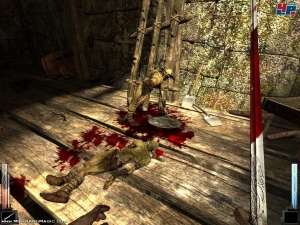 |
Gentle adventurers won't have an easy time: Much blood flows in Dark Messiah. about what happens, which adds another flavor to it.
4P: Talking about first person shooters and especially stories: I know it's being asked a lot these days, but what do you think about episodic content?
Le Breton: I think it's the way we should all start to plan the future in the industry, because I can tell you games are becoming more and more costly, harder to do, and not doing it that way means there will be fewer and fewer games and fewer and fewer studios. Also, I think what happened with TV series in the last five to seven years is really interesting. Before that TV used to be secondary to cinema and now TV series are becoming more and more interesting, high quality products but cost less. A lot less, because they reuse their assets and have less special effects and so on.
And I think video games could benefit from that. Let’s say we will do a game in three or four episodes, we'd basically use the same assets but patch, tune, tweak, add new content etc. It will be cheaper in the end and we have four games instead of one and the general quality, especially in terms of drama, emotion, character building is easier to do in a series than with a single game. Even with Dark Messiah, which lasts for ten to 16 hours we felt we didn't have enough time to build the characters. Because there is a lot of action going on and character building through action is fine, but it's not enough. You need some more dark twists, more drama, crucial choices etc., and that I think is easier to do in an episode or an episodic format.
4P: So, hopefully we can look forward to more and more depth of story
Le Breton: Yes, because that's not what is expensive. It's more finding the good people to do it. What is expensive right now is producing an enormous amount of content with the graphics that are expected for a Next Gen game. Gamers are very demanding, I am demanding too when I buy a game. I want it to look really great, perfectly tweaked etc. But when I
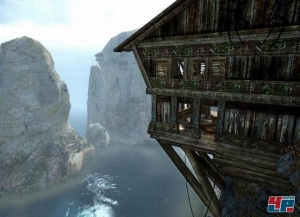 |
The Source engine makes for some beautiful perspectives and impressive views.see the amount of work it requires to just put a character in a single room and make it look great… And especially when you go for photorealism like we do in Dark Messiah, every time you do an animation that is not really perfect, you see it. Because your character looks like you and me, like a human being, a real-life character. So when he performs something that doesn't look like real life, it's ugly, it's crap. The number of animations we're making for the secondary NPCs – it's just crazy.
I played Oblivion and I was a little disappointed, because the characters look like actors and they have great eyes, but the rest is just stiff. I prefer World of WarCraft, because they look like comic book characters, the move like comic book characters, but at least it fits the overall picture.
But I think it's too early for episodic content, because you still feel like: If you pay 30 Euros for a game, it means it's a bad game. We got this psychological mindset which tells you: If it's not 50 to 60 Euros then it's not a triple A. Episodic content is to make games cheaper but to sell them cheaper, too. Right now the idea is that if I don't pay a lot I get a game that's not worth it. I think eventually people will say: "Yeah, I got less content and it's the same engine as former episode, so that's not a big leap, but I know there's quality inside.
Du musst mit einem 4Players-Account angemeldet sein, um an der Diskussion teilzunehmen.